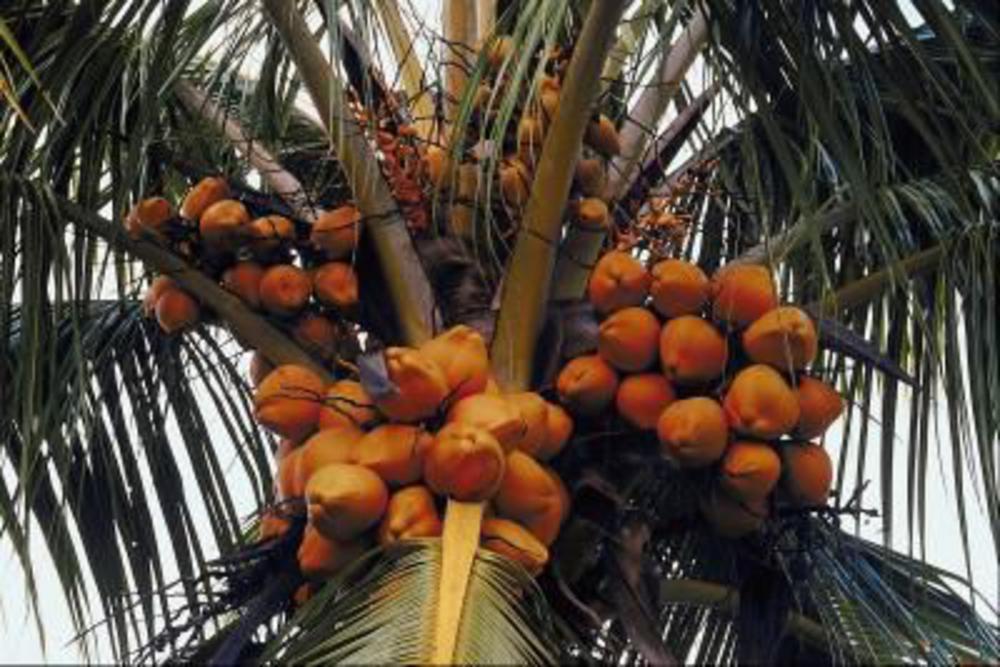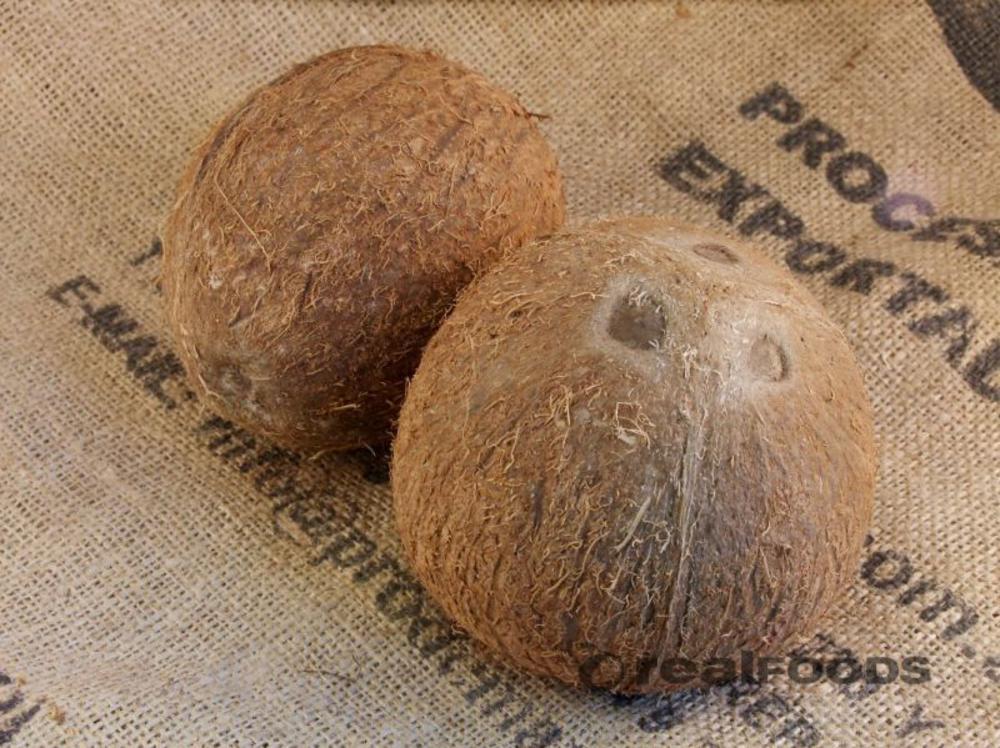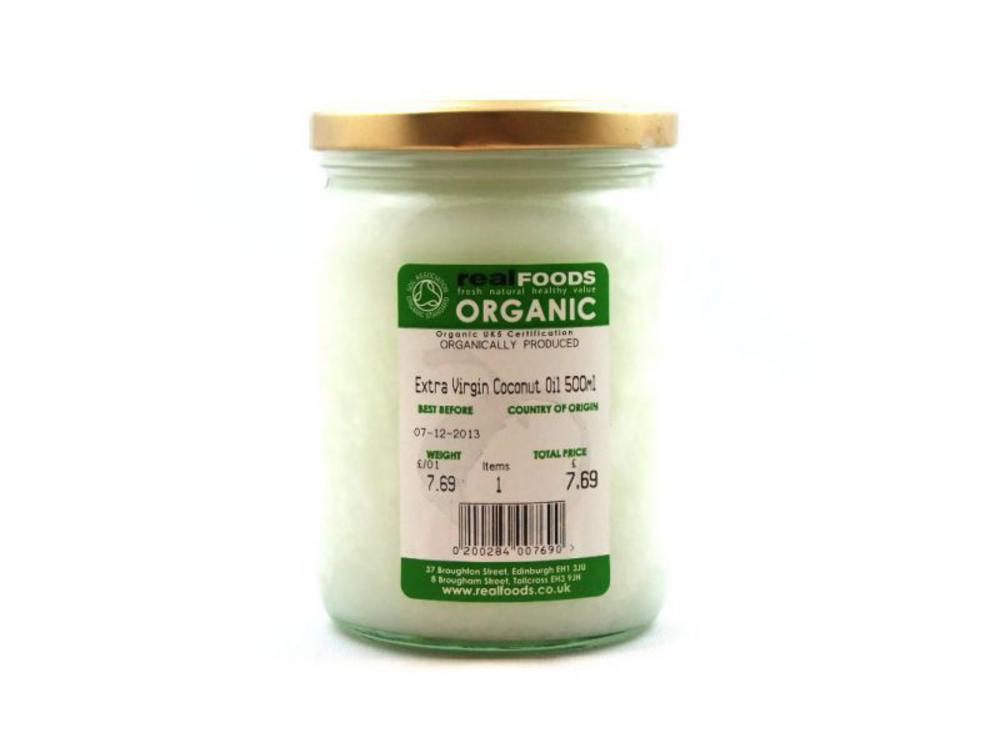Coconut, what’s all the fuss about?

Coconut, what is it and what’s all the fuss about? Because 'nut' is in the name, many people assume that they are nuts, but they are not! Coconuts are in fact the fruit of the coconut tree (a member of the palm tree family)
Humans use pretty much every part of the coconut palm in some manner. In Sanskrit, it is kalpa vriksha ("the tree which provides all the necessities of life"). Use the the Malay language, and it is pokok seribu guna ("the tree of a thousand uses"). If you visit the Philippines you can call the coconut tree the "tree of life".
Previously known as Cocoanut, derived from the Portugese for head or skull because of the 3 indentations every coconut has that look a little like a face.
On fertile land a palm can produce 70 + coconuts a year.
What types of products are there?
There’s the original fresh raw coconuts. Complete with biodegradable, hardy packaging! You can buy them fresh here.
Made from the juice of fresh coconuts, Coconut Water can be natural flavour, or combined with other juices for variety. Younger, greener ones have more water than the mature ones, so it’s usually sourced from them. You can find out more about the benefits of Coconut Water here. It is a refreshing, healthy drink and very popular with sporty types for post-workout rebalancing and rehydrating.
Creamed Coconut is the unsweetened, dehydrated meat of a fresh, mature coconut. It is ground to a creamy paste and is an incredibly useful staple in the cupboard. Keep it in a dark, dry place and it has a long shelf life. You can use in a huge array of recipes. By adding warm water and straining it, you can make milk or cream.
Coconut Milk is made from the flesh of the coconut (the seed). Use it as a non-dairy milk and widely used in Asian cuisines.
Coconut Cream is similar to the milk but contains less water. Made by straining warm liquid through creamed coconut, then leaving to set in the fridge. The cream rises to the top, leaving coconut milk below.
Coconut Oil is extracted from coconut flesh. Use in frying, cooking or as a moisturiser.
Coconut Butter is puréed coconut meat. This is roughly 65% oil, as is the coconut meat it is made from.
Coconut Flour was originally developed to help combat malnutrition, it is popular for baking.
Coconut Yoghurts and Ice Cream are also available, particularly useful for those avoiding dairy, sensitive kids or anyone who is lactose intolerant.
You have all the sweetness and creaminess of dairy, but in a highly digestible form.
Allergies to coconut products are pretty rare.
What can you use Fresh Coconut for (and how on earth do you open it?!)

Opening coconuts is not the easiest and requires some care. Place a whole mature coconut in a preheated oven at 180C/350F/Gas 4 for 15 minutes. (This will help shrink the flesh from the shell). To extract the water, place the coconut in a bowl to hold it upright. Use a drill (clean the drill piece first) to bore a hole in two of the eyes. Turn it upside-down and drain the water into a slightly smaller bowl.
To split it into two halves, either pop the coconut into a tough plastic bag, take it outside and hit firmly with a hammer around the coconut’s circumference or hold the coconut in one hand and firmly strike around it with the back (not the blade!) of a heavy knife or cleaver. It should naturally break in half.
Use freshly grated coconut in curries and creamy puddings, or lightly toast it with spices and use as a seasoning.
What can you do with Creamed Coconut?
Cook! Try this recipe for Coconut and Cauliflower Dhal. Either pop the creamed coconut into warm water to dissolve and add to your dish or grate the coconut directly into the recipe.
Ideal for cooling down spicy soups and giving a creamy base for curries.
Also popular in smoothies and desserts.
What can you use Coconut Oil for?

You can cook with the oil at high heats, so use it for frying or stir-fries, it’s great for popping corn or using as a spread on toast instead of butter or margarine. Use it instead of olive oil to oven roast sweet potato wedges. It can also replace butter in baking recipes, try brownies or flapjacks with heart-healthy coconut oils.
It’s a brilliant moisturiser, have a small pot with you for nails, lips and dry patches. It’s also fantastic for making homemade scrubs (simply add sugar, oats or salt flakes and scrub away your dead skin, easily and with a delicious smell!). Try it on split ends for a natural taming of flyaway hair. It’s also a great massage oil and make-up remover.
What can you use Coconut Butter for?
The butter has a richer texture than the oil. You should use it in baking for a really creamy taste, or it’s a brilliant spread (similar to nut butters’ texture.)
Add it to smoothies, fruit salads, sauces, salad dressings, and baked goods.
Use it as a topping for ice cream.
Mix with cacao nibs or fruit to create your own dessert sensations, or eat it right out of the jar!
Have a look at the different options we sell
What can you use Coconut Milk for?
It’s a base for many Thai curries, simply fry up your curry paste (or make your own by dry frying spices), add your veg and add the coconut milk for a delicious healthy meal.
Use it instead of dairy milk in teas, coffees, hot chocolates and porridge.
Try this recipe for Tapioca and Coconut Pudding with Mango for a fresh, delicious dessert.
There are alse a large range of coconut milks for drinking including flavoured ones, try Rice and Coconut from Isola Bio, Strawberry Coconut Milk from Koko, Chocolate Coconut Milk from Rebel Kitchen or Espresso Coconut Milk from Chi.
Why are coconuts good for you?
They are highly nutritious and rich in fibre, vitamins C, E, B1, B3, B5 and B6 and minerals including iron, selenium, sodium, calcium, magnesium and phosphorous.
The milk is lactose free as well, so can be used as a milk substitute by those with lactose intolerance.
They contain significant amounts of fat. Unlike nuts, however, they provide fat that is mostly in the form of medium chain saturated fatty acids (MCFAs).
In particular, they contain lauric acid. Lauric acid is converted in the body into a highly beneficial compound called monolaurin. Monolaurin is an antiviral and antibacterial that destroys a wide variety of disease causing organisms. Due to this, it is therefore now thought that consumption of coconut milk may help protect the body from infections and viruses.
For all of our coconut products, follow this link.
For all of the recipes using coconuts, use this link